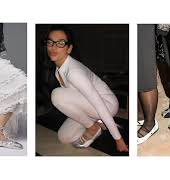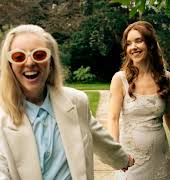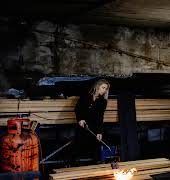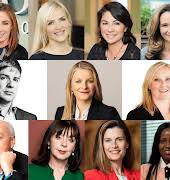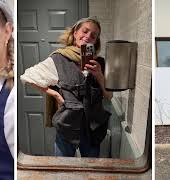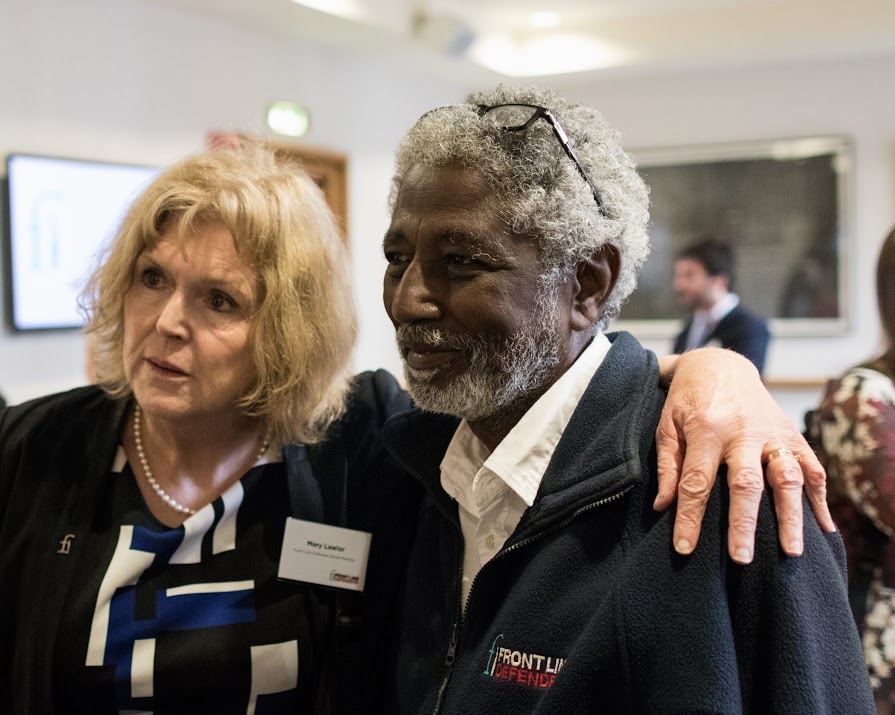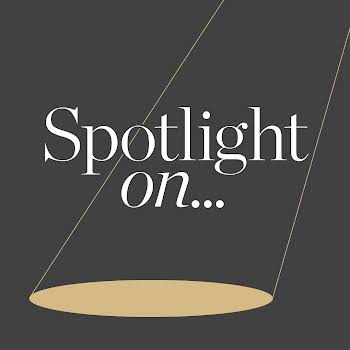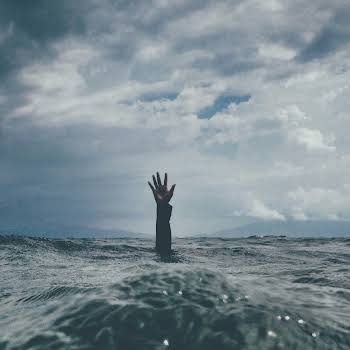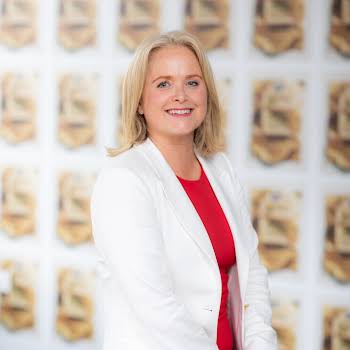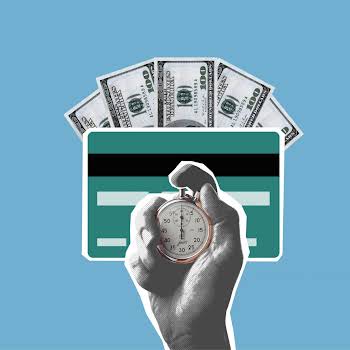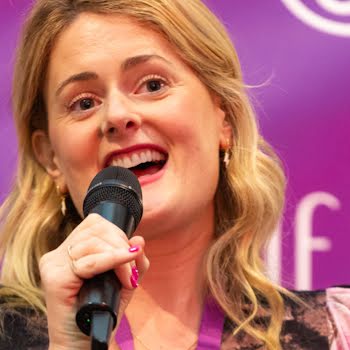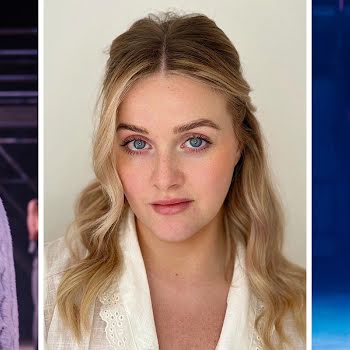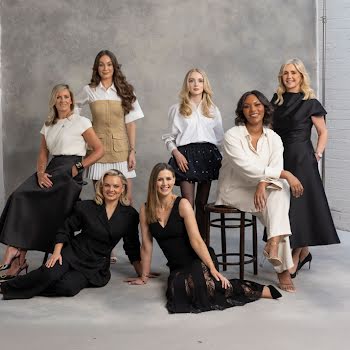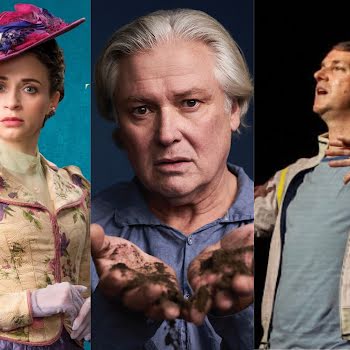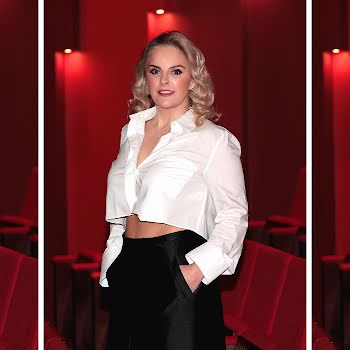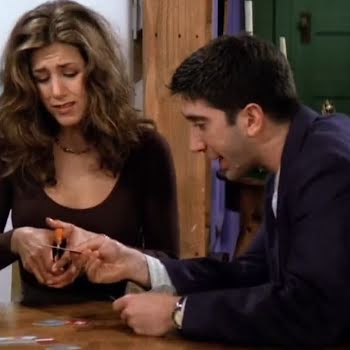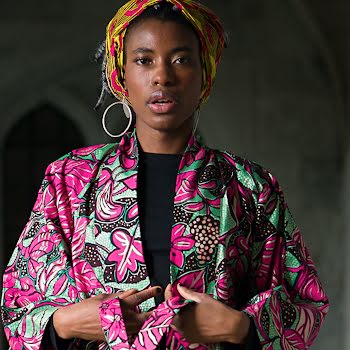
‘You have victories, like when someone is released from prison or an assassination attempt is foiled’
By Dominique McMullan
22nd Oct 2020
22nd Oct 2020
Mary with Sudanese human rights defender Dr. Mudawi Ibrahim Adam
Mary Lawlor is an Irishwoman saving lives and defending people fighting for human rights all over the world. There are currently 598 cases waiting for help in her inbox. Dominique McMullan sat down with her, to hear about her work and life
On May 1st this year, Irish woman Mary Lawlor took up the position of United Nations Special Rapporteur on the situation of human rights defenders.
Mary is an expert in protecting the people who fight for the rights of others. These are people whose lives are very often in danger. Sometimes these people are saved, and sometimes, devastatingly, they are not. There are 598 cases currently waiting for help in her inbox. I had the opportunity to sit down with her over Zoom.
Dominique McMullan: Hi Mary, how do you define who is a human rights defender?
Mary Lawlor: Human rights defenders are people who are working non violently for the human rights of others, and the people we are trying to protect are at risk because of that.
So what do you do in your position as Special Rapporteur on the situation of human rights defenders?
I work with states and individuals to try and persuade them to protect human rights defenders. I spend a lot of time talking to people around the world who are in danger.
It sounds like a high stakes, stressful job.
It can be. But I’m used to it. I’ve been doing this work for 40 years. It’s like trying to push a boulder up a hill sometimes. But you build up resilience. You have to. Music and baths help.
You occasionally have big victories, like when someone is released from prison or an assassination attempt is foiled, or you manage to get a woman who has been raped into a safe house.

What other traits do you need to do this job?
I am very persistent. I have always been that way. That’s extremely important.
In a job like this, you start off full of idealism and determination. You think you can do everything. And then, bit by bit, you realise that you can’t.
What is important to remember is that you can do something. It’s the something that will improve another person’s life. It’s like building a wall, brick by brick. You have little victories. You also occasionally have big victories, like when someone is released from prison or an assassination attempt is foiled, or you manage to get a woman who has been raped into a safe house. The victories keep you going.
What are the hardest bits?
Losing people.
A colleague, Abdulhadi al-Khawaja, who worked in Frontline Defenders [an organisation founded by Lawlor] went back to Bahrain and got involved in the democracy movement there. He was violently attacked at home. The police broke his jaw and brought him to prison where he is now serving a life sentence. No matter what we do, we can’t seem to get him out. It will be ten years next year.
He is someone we all knew well. That’s hard, very hard. [Founder and president of the Bahrain Center for Human Rights Abdulhadi al-Khawaja continues to serve his life sentence for leading pro-democracy protests during the Bahraini uprising in 2011.]
A man I visited in Kyrgyzstan got a life sentence for documenting ethic violence. Despite all the appeals from the UN, the EU, nothing worked. In the end, he died. He died about a month ago. That was very, very tough. Eamon Gilmore actually went to see him when he stepped down as foreign minister, he went to see if he could be of influence. But nothing worked.
Those are the kind of things that are hard.
[Azimjan Askarov was a prominent human rights defender in Kyrgyzstan. He worked to investigate and report cases of police abuse and poor prison conditions, and as a result was targeted by the authorities. On 15 September 2010, he was sentenced to life imprisonment. He was tortured in pre-trial detention facilities. On July 25 2020, Azimjan Askarov died in Kyrgyzstan.]
Natasha Estemirova, who became a friend of mine, was killed in Chechnya. She was a journalist, documenting human rights violations. She had a little girl called Alannah.

Are the rights of women the most globally abused rights?
Women’s rights all over the world are under threat. Even in Ireland, we see the disparity in the rights of men and women. It’s reflected in what women earn; the number of women in politics, in boardroom positions etc.
In patriarchal societies around the world, where there are female cultural stereotypes, women are being attacked not only from within their own family, but also from their community and society. And not only because of what they do, but because of who they are. If a woman steps outside their role as ‘wife’ or ‘mother’ and takes on human rights work, she is targeted.
Natasha Estemirova, who became a friend of mine, was killed in Chechnya. She was a journalist, documenting human rights violations. She had a little girl called Alannah. We had them both over in Dublin for a few months on rest and respite. She went back to Chechnya, and the situation fluctuated.
Then after she published a report she was abducted from her house, and found in neighbouring Bushetta with two bullets in her. Her daughter said to me afterwards that everybody wanted a bit of her, as she was a very well known human rights campaigner in that region. But she said, “Mary, I am not going to let them have her. They had her in life, I’m having her in death”.
She was a very brave, honourable person.
I am so sorry Mary.
Thank you.

Does it make you despair for humanity? Seeing the awful way we treat each other?
No. I still believe in the fundamental goodness of people. There are more and more people becoming involved in human rights around the world. I have travelled to about 50 countries and met so many people. Most people are good.
That’s good to hear. Are there any human rights cases, in particular, you would like to draw attention to?
Yes, my imprisoned colleague Abdulhadi al-Khawaja. And also Nasrin Sotoudeh. She went on a hunger strike for 46 days in September. She works for women’s rights and against compulsory veiling. She has a sentence in which, if you were to add up all the terms of imprisonment, amounts to 38 years. She has a 12 year old daughter and has been in and out of prison for as long as I can remember. Her health is very bad right now and she really needs to be released.
[Nasrin Sotoudeh was on hunger strike in protest against the continued imprisonment of human rights defenders and prisoners of conscience in Iran. She was hospitalised for five days in late September 2020 only to be returned to prison while still ill and despite the continued high rates of COVID-19 in prisons. On 14 October 2020, Reza Khandan, Nasrin Sotoudeh’s husband, expressed concern that the imprisoned woman human rights defender was experiencing “grave cardiac and pulmonary problems”]
I feel like I do have a responsibility to try and make the world better. Otherwise why are you here at all?
It is wonderful that you are a woman, in this position, able to help other women around the world.
At the end of the day, I do this work because I recognise how lucky I am, and my children were. They were brought up with love and care. Now, they’ll complain because I was gone a lot [she laughs], but they weren’t afraid. They weren’t children living in a war zone. They weren’t being targeted.
I feel like I do have a responsibility to try and make the world better. Otherwise, why are you here at all?
Main image: Mary with Sudanese human rights defender Dr. Mudawi Ibrahim Adam

